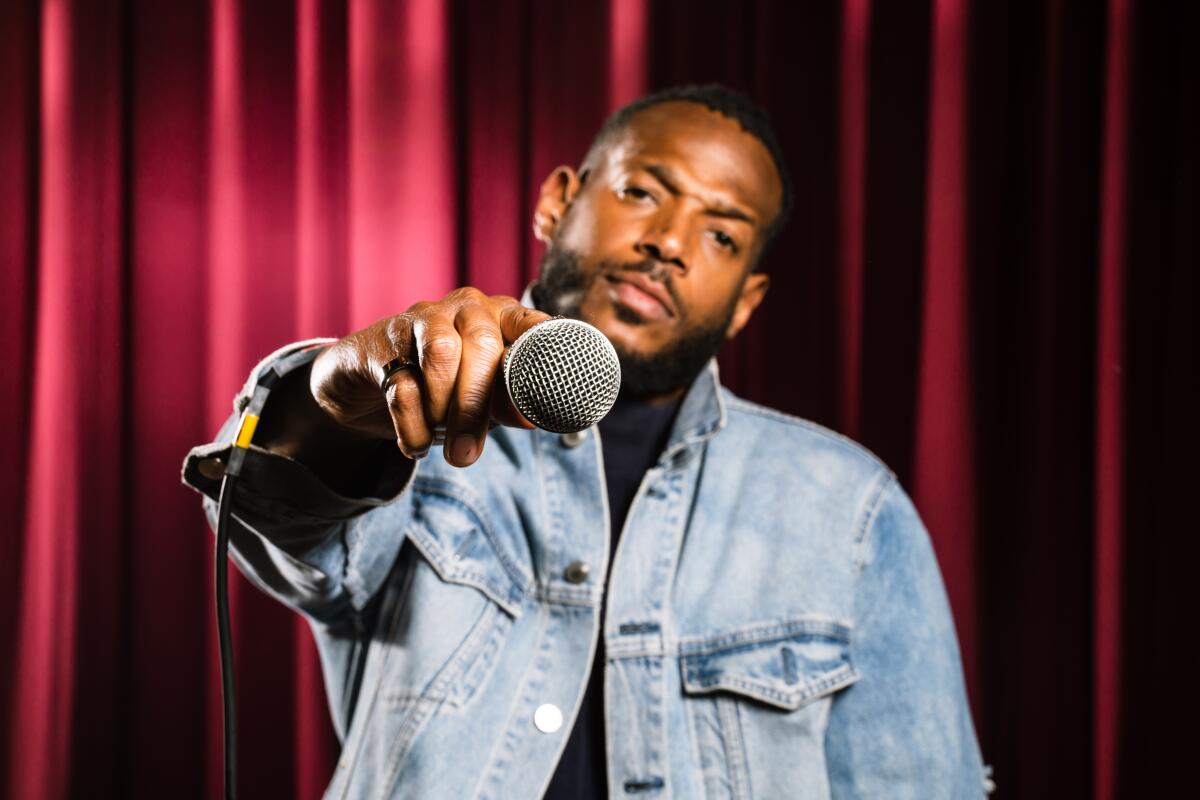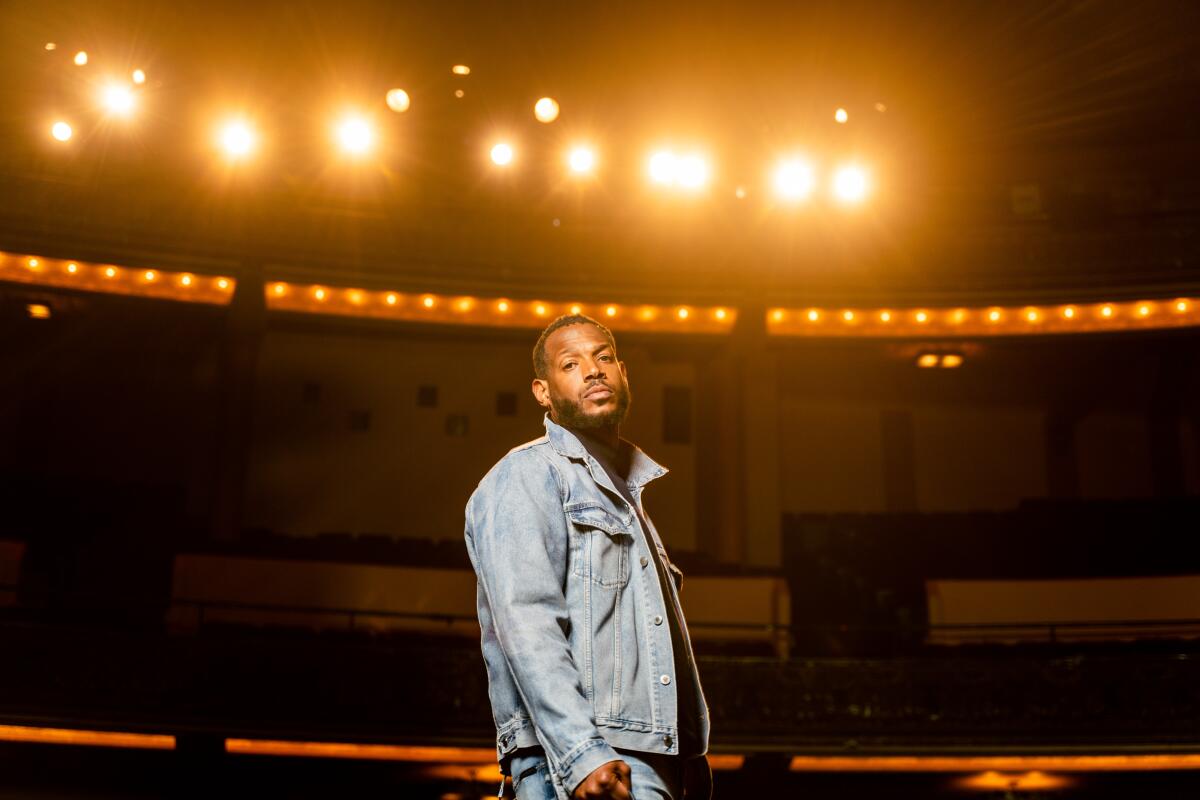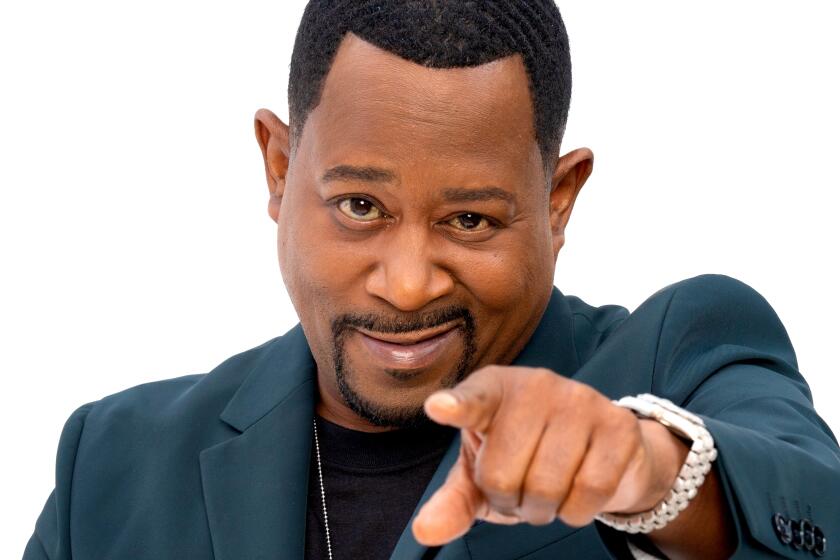Marlon Wayans finds comedy in his grief, just like his parents taught him

- Share via
If time-worn expressions like “time heals all wounds” and “laughter is the best medicine” had a baby, it’d be Marlon Wayans’ new special, “Good Grief.” In the special, which is part love story, part roast, part therapy session, Wayans is effortlessly vulnerable while sharing stories about his upbringing and the unbreakable bond he formed with his parents, Elvira and Howell, as the youngest of their 10 children.
“Good Grief,” which premieres Tuesday on Amazon Prime, doesn’t just offer a front row seat into his legendary family; it’s also hilarious, thought-provoking, relatable and has the power to make you laugh and cry at the same time.
Still, Marlon’s attention hasn’t solely been on the special. He recently wrapped production on a psychological horror film, produced by Jordan Peele with Monkeypaw Productions, called “Him.” In the movie, directed by Justin Tipping and slated to come out in September 2025, Wayans plays a renowned quarterback. He says the experience pushed him to be spectacular. Well, more spectacular.
Coming out shining on the other side of losing his parents in the last three years, Wayans refuses to let his light diminish. Instead, he looks for the comedy, which has always been part of his family DNA.
I loved your new special. I died for the Magic Johnson bit, but I didn’t die.
That’s a crazy bit, huh? I didn’t put it all in the set because I didn’t have enough time, but I’m just using Magic as an example of life sometimes [dealing] you bad cards. But it’s not about the cards you get, it’s how you play them. Magic Johnson got dealt a bad hand with this disease [HIV], yet he still finds a way to live his best life. This whole special is really about finding that glory within your pain.
Starting the special with voice-mails from your mom and dad was so powerful and also a teachable moment because now I want to save the ones I have from my parents.
You better save them all. When you get lonely, you’ll play them. I miss my parents every day, but when I really miss their voices, I have their voice-mails.
Giving fans these personal moments feels so big. Like we’re family too.
I think it’s beautiful to talk about something that hurts you and something that’s real. I think this is my strongest set because as I do more stand-up, I get more personal. And when you start talking about the things that really hurt you, I think that’s when you reach that next level. I think that’s the key to what the art is. It’s one thing to tell a joke, but it’s another thing to tell jokes that are painful. Because then you’re healing yourself and you’re healing other people too. A lot of people are going through what you’re going through, or they will. Unfortunately, we’re all gonna lose our parents. And it’s awful.
Another cool takeaway was, “It’s possible for your parents to be disciplinarians but also your friends.”
You’ve got to give them a shot at being everything. I remember the day my dad died, I had two shows to do. Fifteen minutes before the show, I found out my dad died, and I still went onstage, and I still did my set. The audience had no idea what was going on and then afterward, I sat on the stage and cried as I let them know what happened. The audience was very beautiful and very supportive. I don’t know if they know, but hearing them laugh was healing for me.

“Good Grief” gave me all the feels. After I watched it, I called my parents immediately and told them I loved them.
That’s so great. When I saw “Requiem for a Dream” for the first time, I called my mother after, and I just said, “I love you, and I’m gonna call you more.” It really changed my perspective about my parents, and I think that’s why “Requiem” was such a great movie. Because it has that effect. I hope this special has that effect on people. That they watch it, and then they go call their parents. Tell them I told you to.
Speaking of movies, what can you tell me about “Him” without giving too much away?
I play the greatest quarterback of all time who is trying to get out of his contract, and the only way to do it is to bring in a new franchise quarterback. So I put him through hell in order to make him the next GOAT. Then I’m torn between retiring or staying. It’s a psychological horror thriller. Jordan Peele is producing with Monkeypaw Productions, and Justin Tipping is directing, and he is a visionary. The way this movie looks, he’s done a great job; it looks like a whole different universe. It’s one of those things where you look at the shots, and it makes you want to give a spectacular performance. I can tell it’s going to be a special movie. My co-star Tyriq Withers is a young actor, and he’s really good. And Julia Fox is in it, and she’s great. I think people are gonna really enjoy the movie. You know, Marlon’s tryin’ to do things in the two-thousand-24.
You really are crushing it, and the year isn’t even halfway over. Lucky special No. 4, dropping on the fourth. That’s got to mean something right?
Lucky No. 4. No, it just happened that way. I really wanted to release it on Mother’s Day or Father’s Day, or if not, on a happy Wednesday, but I think it’s a happy Tuesday instead. I feel good. I put myself back together after doing this special, touring and talking about it every night for a few years, so it felt good to release it. It was healing for me. With this special, I try not to pull any punches, whether I’m talking about my parents, myself or even Magic or Shaq [Shaquille O’Neal]. I just want to give people some real comedy. Yeah, it can be a little wild, be a little crazy, and it can be a little bit edgy, but it can also be sweet. It can also be vulnerable. It can be a lot of different things, and I think that all within an hour, you want to feel more than just a laugh, and you will.
More to Read
The biggest entertainment stories
Get our big stories about Hollywood, film, television, music, arts, culture and more right in your inbox as soon as they publish.
You may occasionally receive promotional content from the Los Angeles Times.











